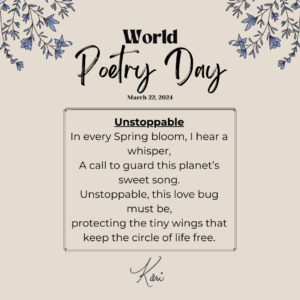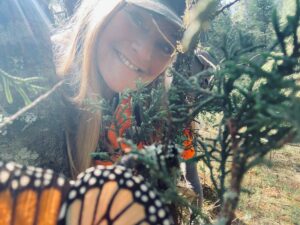Hey there, friends!
As June rolls in, I find myself reflecting on the profound concept of cause and effect, or as some call it, “karma.” It’s a reminder that our actions, no matter how small, can have far-reaching consequences. This month, I want to focus on the cause and effect of one of nature’s most essential beings – pollinators. June is National Pollinators Month, and it’s the perfect time to understand why supporting these incredible creatures matters for our environment, our businesses, and our collective well-being.

Pollinators, such as bees, butterflies, birds, and bats, play a vital role in our ecosystem. They facilitate the process of plant reproduction by transferring pollen from one flower to another, enabling fertilization and the production of fruits, seeds, and new plants. This process ensures the diversity and abundance of plant life, which, in turn, sustains countless other species, including us lovely, intelligent, already too traumatized human beings. We certainly don’t desire more trauma than we’ve endured the past few years.
However, the world of pollinators is facing an extinction-level trauma. Scientists are calling it: pollinator collapse. I personally saw the cause and effect of a loss of pollinators as a Western ND regenerative farmer in the 90’s when the bee subsidies went away. Suddenly, the bees disappeared, negatively impacting our crop yields. Many small farmers went bankrupt. Worst of all, imported honey made with petroleum started flooding the market to quickly profit from the unmet demand for honey, and Americas lax import policy.
Naturally, that didn’t make the news, neither did the crop failures. The honey subsides did come back, praise God. We lived to farm another decade. Today, after another 20 years of habitat loss, industrial farming pesticide use, evolutionary + man made climate change, along with the spread of invasive species (due to international border cuts of extermination services) have further impacted pollinator survival. It’s at a cris level now, and we are all witnessing a ripple effect throughout our ecosystems – dwindling plant populations, loss of biodiversity, and disruptions in the delicate balance of nature. It’s no longer for farmers eyes only.
At EarthKind, the company I founded to make it easy to keep bugs & rodents out of your homes and storage areas, is pollinator-friendly…. and, our ingredients are grown on family farms. We believe that every creature, big or small, deserves respect and humane treatment. In fact, we’re the only brand that considers the cause and effect of kill/poison of insects and rodents on our collective human psyches and ecosystems. We prioritize sustainable pest control solutions that are not only solve the root of the pest problem, they protect both human health and the well-being of our environment as well. We’re all quite proud of that.
On World Environment Day (June 5th) and World Pest Day (June 6th), let’s take a moment to reflect on our actions and how they impact the delicate web of life around us. As businesses and consumers, we have the power to make a difference. Here are a few reasons why supporting pollinators and choosing EarthKind’s eco-friendly pest control, and other sustainable household brands, matters:
- Biodiversity Preservation: By protecting pollinators, we contribute to the preservation of biodiversity. Healthy pollinator populations help maintain diverse plant species, ensuring the survival of countless organisms that rely on them. It is estimated that 87% of all flowering plant species depend on animal pollinators. (Source: IPBES Global Assessment Report on Biodiversity and Ecosystem Services)
- Food Security: Pollinators are responsible for pollinating a significant portion of the world’s food crops. Supporting their well-being directly contributes to food security and sustainable agriculture. Pollinators contribute to the production of more than 75% of the world’s food crops, including fruits, vegetables, and nuts. (Source: Food and Agriculture Organization of the United Nations)
- Environmental Balance: Pollinators play a crucial role in maintaining the balance of ecosystems. Their activities promote healthy habitats, support wildlife populations, and contribute to overall ecosystem resilience. Pollinators support the reproduction of more than 85% of flowering plants, helping to sustain terrestrial ecosystems. (Source: The Xerces Society for Invertebrate Conservation)
- Sustainable Business Practices: As businesses, we have a responsibility to adopt sustainable practices. Choosing EarthKind’s eco-friendly pest control products not only protects the environment but also aligns your brand with conscious consumer values. According to a survey, 73% of consumers are willing to pay more for products that come from sustainable brands. (Source: Nielsen Global Corporate Sustainability Report)
Remember, every action we take, whether as individuals or organizations, can have a profound impact on our planet for our children’s, and grandchildren lives. I challenge you to consciously support pollinators this month, embrace sustainable pest control solutions, and create a ripple effect of positive change for generations to come.
Together, let’s be the cause that sets forth positive effects, nurturing a healthier planet and a more harmonious coexistence. Are you with me?
Stay tuned for more content throughout National Pollinators Month, where we’ll explore the wonders of these incredible creatures and how we can make a difference.
In harmony with nature,
Kari


